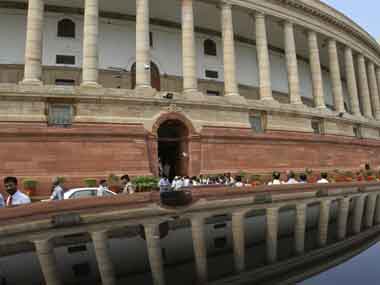Parliament is celebrating its 60th anniversary, and MPs got together “to uphold its dignity, sanctity and supremacy”. Does this ‘solemn pledge’—the general description in our newspapers—mean anything at all? It probably means different things to different people. The Prime Minister says, “Leaders of parties should sit together to find ways to raise issues in a manner that does not stall parliament.” Sonia Gandhi says, “Our conduct must rise to the highest ethical standards followed by the founding fathers of our nation.” Arun Jaitley says, “If India can grow 7 to 9 percent with inadequate governance, what would be our growth potential if the nation was governed well?” Sonia Gandhi’s clichés are at least neutral, whereas Manmohan Singh’s and the Leader of the Opposition’s statements state their partisan positions: the PM wishes that Parliament passes bills while Jaitley harps on government incompetence. What consensus on parliamentary behaviour can you get with these different approaches? And what possible dignity is there in the House, when MPs spend days brandishing a decades-old cartoon and make it an issue of national importance? Take a look at the cartoon—reproduced in Firstpost some days ago and in The Indian Express on Monday, 14 May – and you will see that Shankar’s drawing is as innocuous as can be: Ambedkar is sitting on a snail called ‘The Constitution’, trying to whip it to go faster while behind, Jawaharlal Nehru, is also trying to whip it to gain some speed (Mischievous MPs interpreted the cartoon to suggest that Nehru was whipping Ambedkar! So much for upholding dignity, sanctity and all that balderdash). This incident once again confirms many of our national failings: to start with, we have no sense of humour, something we reinforce again and again. We also are quick to deify our leaders. Is Ambedkar a god that the cartoon committed ‘blasphemy’, as claimed by some Dalit leaders? Ambedkar was a learned man, held in such high esteem by our founding fathers that they gave him the huge responsibility of drafting our constitution. But he wasn’t a god, and if he had been alive, I am sure he would be embarrassed at the way Dalit leaders now put him on a pedestal equal to the Buddha. (Come to think of it, even Gautam Buddha would have been upset that he had now been made into a deity, something he fought against all his life). Another observation: our politicians, and our revered MPs, have absolutely no sense of proportion. Let us assume someone noticed a disparaging reference to a national leader in a textbook. What would be the rational way to deal with it? To quietly draw the attention of the HRD minister and get it rectified. But—and here’s the joke about upholding the dignity of Parliament—if something was done quietly, there would be no disruptions, right? And that’s what our decorous MPs want, don’t they? A ruckus a day keeps thought away. These mindless disruptions were followed by Kapil Sibal’s abject capitulation: no defence of the freedom of expression, no defence of the context of the cartoon and its real meaning, just craven apology. That’s the way it always is: at the first sign of trouble, the government caves in and bans, withdraws, proscribes, etc. etc.[caption id=“attachment_309575” align=“alignleft” width=“380” caption=“Parliament of India. Reuters”]  [/caption] If we look at things in an objective way—which we can do since we are not MPs upholding dignity, decorum and the like—we would be rather pleased that textbooks actually reproduced cartoons to lighten up heavy text and to make difficult subjects approachable to students, that criticism of leaders was not ignored so that students got a balanced picture of modern political history, and not a reverential take on it. But then, objectivity and rationality is for Us, not Them. Let Them celebrate 60 years of Parliament. We can only watch from the sidelines, in increasing sadness.
Parliament is celebrating its 60th anniversary. One wished its members could show the level of maturity of a 60-year-old.
Advertisement
End of Article
Written by Anil Dharker
Anil Dharker is a writer and columnist on social and political issues. see more


)
)
)
)
)
)
)
)
)



